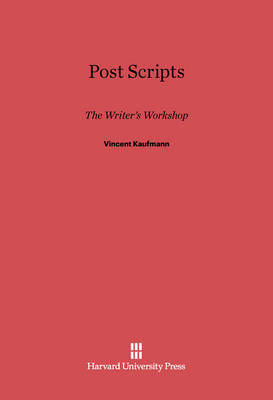We assume that words are posted (mailed or, in another sense, positioned) to communicate with others, to bridge distance and "wish you were here". However, Vincent Kaufmann discovers in his chosen letter writers the urgency not to communicate, to keep their correspondents away, and, as it were, posted. The writer avoids real-life dialogue by way of letters, which then become proving grounds for the work to come. Whatever their intellectual, biographical or aesthetic value - compare Flaubert's passionate dogmatizing to Baudelaire's peevish nagging for money - letters teach writers how to appreciate the sound of their own voice and how to make a workable literary space. Distance gives the relentless letter writer the chance to become a writer. Kaufmann, with Lacan, says that what characterizes the literary text is the ability to get beyond a particular other to address the Other, which must be no one in particular. Kaufmann features several European writers, all of them avidly concerned about the destination of speech when it passes into writing.
Among them: Kafka, obsessions spilling over, adoring his fiancee for her emptiness; Proust, master of suffering, with his interminable health bulletins, cancellations and condolences; Flaubert, an extraordinary letter writer, abandoning his mistress for the more seductive Emma Bovary; Baudelaire, determined in squalor, writing letters almost exclusively about his debts, as if to practise the art of escape and defiance; Mallarme, patron saint of litterateurs, whose vaunted Book disappears into salons and letters; Artaud, speaker in tongues, who wildly searched for authenticity through letters. Unending attention has been devoted to these important writers, but they seem new again when viewed in Kaufmann's epistolary mirror. What they share is a taste, or need, for distance and perversion; we see them becoming "inhuman" in order to textualize their lives. They are all modernists, and the definition of Modernism is thereby deepened. This book - rich in anecdote and humour - escorts literary theory into the no-man's land stretching between the life and the word.
- ISBN13 9780674335714
- Publish Date 1 January 1994
- Publish Status Active
- Publish Country US
- Imprint Harvard University Press
- Format eBook
- Pages 199
- Language English
- URL http://degruyter.com/search?f_0=isbnissn&q_0=9780674335714&searchTitles=true
